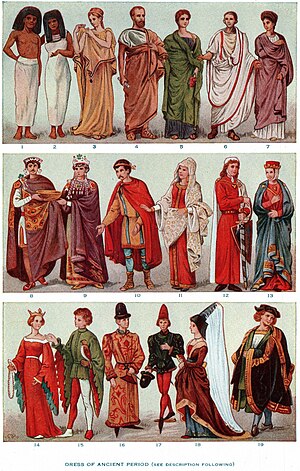 In the beginning the man and his wife were naked, but not ashamed.
In the beginning the man and his wife were naked, but not ashamed.- Shame & dishonor are terms contingent to the world of sin
- Where there is sin there is the sense of shame & dishonor
- Nakedness is contingent on sight and the sense related to it. It is not merely sexual (for the woman and man wouldn’t feel ashamed of each other with regard to that)
- Clothing is not just a symbol; it is a remedy… it is a basic need.
- Physically it covers against the antagonistic physical forces.
- Psychologically it remedies shame by hiding nakedness.
- Nakedness needs to be hid because man has become a private being.
- Nakedness relates to the organs primarily associated with sexuality.
- “Culture” (concepts and customs) play important rule in defining “nakedness” and “shame”
- “Cover” indicates the need for privatization of sexuality in a world that has grown adverse. It symbolizes the first instance of alienation and threat of privacy and dehumanization by bestial humans. “Uncovering” is only permitted where mutual self-giving has occurred through a nuptial covenant. To “uncover” would mean to bare the private areas; to “know” would mean to experience the privacy of the other through union. These are terms conditioned by the culture of shame.
- The sense of “nakedness” is not a solitary and subjective sense. It is a generic human sense. It is a sense and a feeling (quite unrelated to the original fact of nakedness without shame). It is a social sense. It is the sense of knowing original sin; that “all have sinned”. The sense of “nakedness” will not exist in solitariness or before those who do not have the “knowledge of good or evil” (e.g. children).. unless the self has been unnaturally deformed by sin. Nakedness and fear of moral evil are related. Adam’s fear involved distrust of and alienation from God.
- This “original nakedness” (as a sense not as a fact) would be impossible to be broken. Thus, all offspring, henceforth, though born in a state of innocence, will soon be covered by the culture of shame and honor; for the moment, they have the insight into their own sexuality, they’ll see the need for cover.
Q. Did God appear to them clothed?
- Mark of Sin-clothing: Fails to Cover the Private Parts (Highlights them). Is Shameless.
- Mark of Righteous Clothing: Covers Well. Symbol of Honor. (later history, Ring, Crown, Veil…).
- Animals might have been killed since then to cover the nakedness of man.
- God is not against the sense of shame & honor, which are the senses of a rightly functioning conscience.
- God provides clothing in the world of sin (cf. Matthew 6).
Clothing plays an important role in divine communication with man.
- Heaven and angels do not appear without a covering of some kind. Why? What kind of clothing is that? Glory? Raiment?
- God specifies the clothing for the priests and His covenant people.
- Symbols relate to things that are known and mediate to convey things yet unknown (Angels using swords, for instance; what would angels appear wearing today?)
God institutes the Veil in Worship
- The Veil that separates the people from the Holy Place
- The Veil that separates all from the Most Holy Place
- Nakedness must not be exposed.
- Man must not approach except in proper covering: Clothes, Animal Blood.
God ordains the tearing of the Veil.
- It is not the removal of the veil; but the piercing through it.
- The Veil was pierced through the Flesh of Christ.
- The Temple Veil was torn.
- Where the Spirit of the Lord is there is freedom and we can behold Him face to face with unveiled faces.
- We are the Most Holy Place of God.
Paul instructs headcovering for woman, and removal of headcovering for man during worship
- The New Covenant hasn’t done away with the Original Shame. Man still needs the covering of his nakedness; between humans. His spiritual nakedness, however, is done away before God. He’s clothed with Christ. But, the generic sense of human sinfulness and nakedness still exists. The symbol of clothing is not removed even in the visions of heaven in Revelation.
- Shame and Honor are often gender relative (what is shame for man (e.g. long hair) is honor for woman).
Questions for Discussion:
- How can nature (physis) teach about shame and honor; that long hair for man is dishonor while long hair for woman is honor?
- Is such specification absolute (natural) or just relative?
Further Points:
- Noah’s loss of sense due to drunkenness, his nakedness, and the curse of Ham
- The veil of Rebekah
- The veil of Tamar
- Ruth’s uncovering of Boaz’s feet
- The mantle of Elijah
- The concept of “Cover” in both Covenant and Clothing: Tabernacle and Society.
- The man who fled naked in Gathsamane
- The robe of Jesus that was cast lot upon
© Domenic Marbaniang, 2012
Comments
Post a Comment